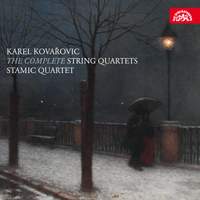Recording of the Week,
Karel Kovařovic's complete string quartets from the Stamic Quartet
As the summer is always a relatively quiet time for new releases, we’ve decided to rewind a few weeks today and turn the spotlight on an album which won over everyone in the Presto office with its gentle charm (no small feat since we went open-plan last year, I assure you!) when it arrived in our mailbag at the beginning of June. The world premiere recordings of chamber music by a relatively obscure Czech composer writing at the cusp of the twentieth century might not sound like the sort of thing that makes for easy workplace listening, but the Prague-based Stamic Quartet’s advocacy of Karel Kovařovic’s three string quartets (technically two-and-a-half, since the third is unfinished) brims over with a sunny affection that’s hard to resist.
 Born in Prague in 1862, Kovařovic studied composition with his compatriot Zdeněk Fibich and was championed by Dvořák (to whom he dedicated the opening work on the album, the String Quartet No. 2 in A minor from 1887) as a young man; Kovařovic went on to repay the favour with interest in his subsequent career as an opera conductor, presiding over the premiere of Rusalka in 1901 during his long spell as head of opera at Prague’s National Theatre. Indeed, his success in this capacity was something of a mixed bag for his legacy in several respects – partly because his commitments in the opera-house curtailed the time available for composition, partly because posterity has taken a relatively dim view of his insistence on making substantial revisions to one of the greatest of all Czech operas, Janáček’s Jenůfa, before eventually allowing it to be staged at the theatre some dozen years after seeing the original score. (The booklet-note argues, in Kovařovic’s favour, that the work would never have been received so positively in its unadulterated form, though in recent decades his revisions have commonly been jettisoned in the opera-house and recording studio).
Born in Prague in 1862, Kovařovic studied composition with his compatriot Zdeněk Fibich and was championed by Dvořák (to whom he dedicated the opening work on the album, the String Quartet No. 2 in A minor from 1887) as a young man; Kovařovic went on to repay the favour with interest in his subsequent career as an opera conductor, presiding over the premiere of Rusalka in 1901 during his long spell as head of opera at Prague’s National Theatre. Indeed, his success in this capacity was something of a mixed bag for his legacy in several respects – partly because his commitments in the opera-house curtailed the time available for composition, partly because posterity has taken a relatively dim view of his insistence on making substantial revisions to one of the greatest of all Czech operas, Janáček’s Jenůfa, before eventually allowing it to be staged at the theatre some dozen years after seeing the original score. (The booklet-note argues, in Kovařovic’s favour, that the work would never have been received so positively in its unadulterated form, though in recent decades his revisions have commonly been jettisoned in the opera-house and recording studio).
On the evidence of the three works here, it’s easy to see why the more radical aspects of Janáček’s writing didn’t sit comfortably with Kovařovic – even in the later, unfinished quartet from 1894, his musical language is generally conservative, with one foot in Classicism and another in Romanticism and only the occasional dip of a toe into the encroaching sound-world of Modernism. But he has the art of the backward glance down to a tee: the delectable variations which constitute the slow movements of the first two quartets sing with a cantabile grace that owes a great deal to Schubert, whilst the influence of Dvořák is unsurprisingly evident in the furiant scherzo of the A minor quartet (a maddeningly catchy ear-worm, this!). Folksy melodies abound (Kovařovic was a passionate Czech nationalist), but their execution has none of the dirt-under-the-fingernails quality or craggy grandeur that one often finds in Dvořák, Smetana and Janáček – we’re located firmly in Prague’s drawing-rooms rather than Bohemia’s woods and forests here.
 In several respects it was the early D major quartet that struck me as the most outward-looking (and perhaps forward-looking) of the three works: the exuberant, soaring melodies of the outer movements put me in mind of Elgar, of all people. The Stamics embrace its expansive lyricism with just the right balance of sweetness and astringency, as indeed they do everything here, pointing up modulations in the development-sections with subtle changes of tone-colour which give the impression that Kovařovic is venturing further afield harmonically than he actually is.
In several respects it was the early D major quartet that struck me as the most outward-looking (and perhaps forward-looking) of the three works: the exuberant, soaring melodies of the outer movements put me in mind of Elgar, of all people. The Stamics embrace its expansive lyricism with just the right balance of sweetness and astringency, as indeed they do everything here, pointing up modulations in the development-sections with subtle changes of tone-colour which give the impression that Kovařovic is venturing further afield harmonically than he actually is.
Kudos to the Stamics and to Supraphon for this warmly realised restoration project, then: these highly attractive works should appeal to anyone who’s in the market for some quirky but relatively undemanding summer listening as well as those with a passing interest in Czech chamber music. The sleeve-notes suggest that the editions which were reconstructed for the recording are being prepared for publication – all three pieces sound as if they’d be within the hitting-zone of most good amateur quartets, so here’s hoping they find new fans among performers and listeners alike. I may even suggest them for one of our regular informal chamber-music concerts here at Presto…
Stamic Quartet
Available Formats: CD, MP3, FLAC, Hi-Res FLAC



